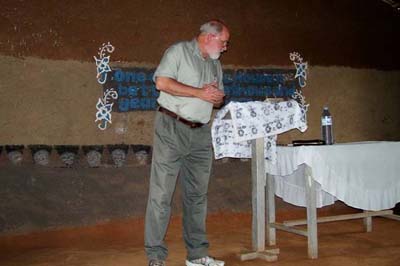
“The Holy Spirit wants to Glorify Jesus Christ.”

To see more pictures, visit my Kodak Gallery and click "view slide show."
From July 14-25, 2008, I had the privilege of teaching a theology course on Pneumatology (the doctrine of the Holy Spirit) to thirty pastors and church leaders from Uganda and Kenya in Nakaloke, near Mbale, Uganda. We used my world famous (i.e., known to about thirteen people in the U.S. and now thirty in Uganda) textbook on the subject, The Person and Work of the Holy Spirit, which you can order online from Wipf and Stock or my website if you want to see what we studied. My students were rural pastors who do not have access to higher education. They can't go to Bible College or Seminary, so my role is to take a little Bible College to them.

“The Holy Spirit wants to Glorify Jesus Christ.”
My basic thesis in the course was that both Charismatics and non-Charismatics have missed the boat, sending each other screaming in opposite directions away from the actual teaching of Scripture. If you want to know more, if I have piqued your curiosity, buy the book! What I try to do is to develop a Christocentric Pneumatology. If that phrase turns you on, you would actually enjoy the book. Since most Protestants in this area are Pentecostals either officially or without knowing it, we were destined to have some interesting discussions before we were done. Over all they seemed very receptive. But we had to tread on some very sensitive ground when we got to the topics of the Second Blessing, Baptism and Fullness of the Spirit, and the Spiritual Gifts.
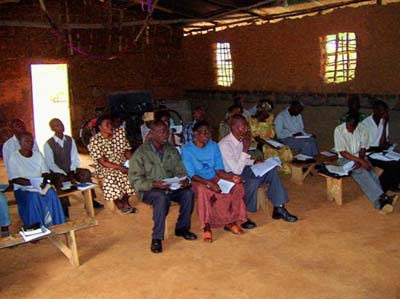
Attentive Students
Africans are not used to discussion-- they expect to be lectured to and to write down every word the Muzungu (white man) says--and it took them a while to get used to the idea that I actually wanted them to respond and participate. I was with them about six hours a day so that we could get a full course done in two weeks, and Socratic method doesn't work very well there until about the end of the second day--unless you just give up before then, in which case it never does. But I am, as some of you know, incredibly stubborn. About the last thirty minutes on the second day I felt we had a breakthrough and things started flowing better. One of the most important things I do for the Africans is encouragement--I think empowerment is not actually too pretentious a word. So success in getting them talking is even more important than with American students. I still did plenty of spouting; don't worry about that! (Not making this admission would cost me some credibility with my former students back home. Go ahead and laugh!) By the third day I had gained their confidence and the questions and answers flowed freely.
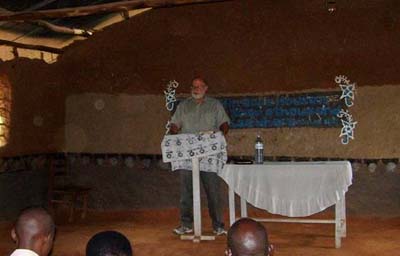
“How does this ministry of the Spirit achieve his purpose of Glorifying Jesus?”
One of the most interesting and stretching aspects of teaching in Africa is the questions you get to try to answer. Here are some of the new ones I got this time, with the (highly condensed) answers I tried to give.
If John the Baptist was filled with the Holy Spirit from his mother's womb, how could he have come to doubt the Lord ("Are you the one who is coming or do we wait for another?")?
DW: Let that be a warning to us. Being "filled" with the Spirit may give us power for service, but it does not make us infallible.
If Satan is not divided against himself (according to the Lord's argument against the Pharisees), how is it that Witch Doctors can cast out demons?
DW: Are we sure that they can? Do their "exorcisms" have permanent results like the Lord's did? [Much uncertainty here from the Africans.] Conclusion: we do not seem to be in a position to draw any conclusion from these alleged exorcisms. But we do know that the Lord spoke truly.
Why is the Holy Spirit less forgiving than Jesus? For Jesus said a word against the Son of Man could be forgiven, but not blasphemy against the Holy Spirit.
DW: This question illustrates what I have been saying about the importance of context. What happened right before Jesus' words about blasphemy against the Holy Spirit? The Pharisees had attributed Jesus' exorcisms to the power of Beelzebub. Confronted with undeniable evidence of his Messiahship, they still stubbornly refused to believe. Therefore the only unforgiveable sin is refusal to receive Christ. Since Christ is the ground of the atonement, that sin is by definition unforgiveable, because by its very nature it shuts us out from God's forgiveness. In this case it was called “blasphemy against the Holy Spirit” because it took the form of attributing the Spirit’s work to Beelzebub. It has nothing to do with which member of the Trinity is more forgiving.
I named my son after my father, who had died. Then my son died in infancy. Did I curse him by giving him my father's name?
DW: Dear sister, there is nothing in Scripture to support the idea that you could curse your son simply by trying to honor your father, which is itself something Scripture commands us to do. Please be free from any guilt or fear that you somehow caused this by the name you gave him. The sadness of his death is enough. Do not add any further burden to that, which Scripture does not lay on you.
That last question is enough to break your heart. But I wish you could have seen the joy on Betty's face when she heard the answer. Truly (as if they needed it) the words of the Lord were being confirmed daily in our class: "You shall know the truth, and the truth shall set you free." Never was the old saw proved more true since man first spoke with mouth.

African Church Art
Monday and Tuesday of the second week were in some ways the most difficult days, because I have a very different perspective on things like The Baptism and Fullness of the Spirit and Tongues than most of my pastor students, who, as I have mentioned before, are mainly Pentecostals. They went from very receptive (the first week), to somewhat skeptical and resistant, to having to admit that there is no biblical basis for saying that, for example, Tongues are the definitive sign of the baptism of the Holy Spirit. And here we came to a very dangerous moment. What would they do when they got back to their churches and their denominations? If I was not very careful, I would only sow dissension there without doing any real good at all.
I snuck up on this issue from the side. "Whenever we have received teaching that others do not have, we are tempted to become proud," I began. "Knowledge [alone] puffeth up, but love edifieth. So when we go back to our churches," I continued, "what shall we do? Shall we start attacking other preachers or our denominational leaders as teachers of false doctrine? If we do that, we will only make them angry and defensive and we will do no good. No, we will just start positively teaching--and living--the larger, more whole, and more wholesome vision of the truth we have been given. In love we will teach our people to be open to a fuller version of the work of the Holy Spirit [nice irony there, by the way, given the name of the 'Full Gospel' movement!] than they have known: not focused on tongues and ecstatic experiences as ends in themselves but on conviction and calling and regeneration and sanctification and glorifying Jesus by being conformed to his image and giving him and his personal Agent, the Spirit, all the glory for our salvation. And we will pray that God will use this to glorify his Son and that as Jesus is glorified others will also be drawn to a better understanding. Otherwise, we may go back with the truth, but it will be with the wrong spirit." They enthusiastically agreed with this, but some said to me privately afterward that if I had not said it their first instinct would have been to do just what I had warned against.
This is the kind of victory that has to be won in ministry here if we are to do more good than harm--which is probably not so much different from anywhere else after all. On Friday the 25th we concluded with a comprehensive examination. Those who passed were given “certificates of completion”; the few who did not got “certificates of attendance.”
On the three weekends that sandwiched our two weeks of class, I preached six times in four different churches: twice at Kachumbala Reformed Bible Fellowship and Kalonyi Assembly of God, and also at Christ’s Coworkers Church in Kalonyi and and Sidimbire Church of God.. In two of them I prayed with an individual who had come forward to accept Christ as personal savior. One afternoon after our class I spoke to an assembly at Evaross Secondary School, a Christian high school in Mbale, on a Christian view of learning.
A hearty thanks to all who supported this mission with prayer and finances. Please continue to pray for the pastors in my class. As I said to Rev. John Robert Opio, the director of Christian Life Teachings International, the local training ministry that had invited me, “They left more reformed than they came.” Some of them have some serious rethinking to do, and they all need wisdom as to how to apply what they have learned. Pray that they will “commit what they have learned to faithful men who will able to teach others also” (2 Tim. 2:2). If that happens, we can consider the mission a resounding success.
Yours for His glory,
Donald T. Williams, PhD, Pastoral Trainer
Church Planting International
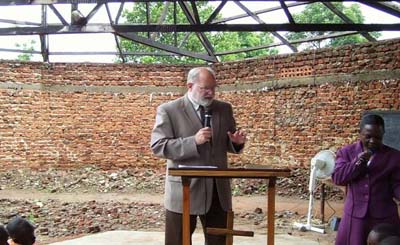
“The Foundation of the Gospel . . . The Facts of the Gospel . . . The Fruit of the Gospel”

Attentive Congregation receives the Word expounded
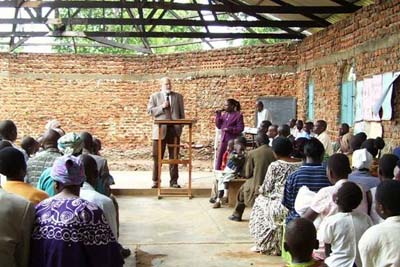
Preaching at Christ’s Coworkers Church
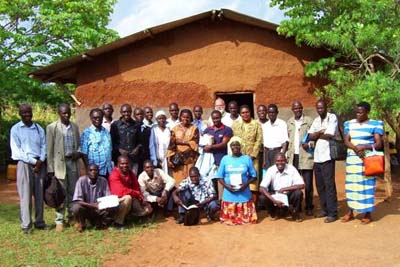
The Class of 2008
Read the 2002 Uganda Missions Report.
Read the 2003 Uganda Missions Report.
Read the 2004 Uganda Missions Report.
Read the 2005 Uganda Missions Report.
Read the 2006 Uganda/Kenya Missions Report.
Read the 2008 Uganda Missions Report.